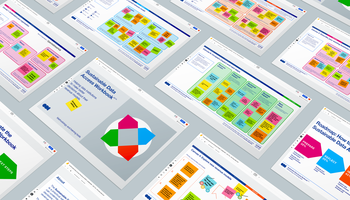
Sustainable data access: why is it important?
- Project: April 2020 - March 2021
Access to data is a crucial enabler for innovation. There are various types of data access initiatives which help to support access to data, as demonstrated by the ODI’s R&D work on the Data Access Map. These include open data initiatives, data portability initiatives and data sharing initiatives. In each case, there are organisations that support the initiatives and carry out activities including scoping, designing, operating, evaluating, and sometimes closing down said initiative. When done well, in ways that are trustworthy and promote the use of data, the activities they engage in can be costly and require funding. As such data institutions and organisations looking to set up and run a data access initiative will need a business model that supports the activities necessary to sustain the institution or initiative.
Our approach
In this project we carried out research to explore the landscape and impacts of different business models in current data institutions and data access initiatives. We also ran pilots, engaging with a number of data institutions and data access initiatives in a range of contexts to understand and develop their business models. In addition we developed tools and guidance for supporting the planning and delivery for the different phases of a data access initiative or a data institution’s life cycle, as informed by the pilot and research workstreams.
In March 2021, we launched the Sustainable Data Access Workbook, designed to support organisations that steward data to make better decisions about their revenue models. The workbook contains six canvases which seek to practically support organisations to reflect on and evaluate their current situation, imagine a new path forward and decide on the next steps needed to bring it to life. The workbook and the canvases are still in the beta stage.
Background
This work was part of the fourth year of our research and development programme, funded by Innovate UK, the UK’s innovation agency. The project builds on the exploratory research into designing sustainable data institutions that was undertaken in the first quarter of 2020, and can be read below.
Get involved
Want to take part in our research or discuss our work going forward? Get in touch.
This work formed part of an innovation programme, which ran up to March 2021, with funding from Innovate UK, the UK’s innovation agency.
Through our R&D programme, we aim to shape future services and promote productivity and growth with cutting edge expertise.
Exploratory research on designing sustainable data institutions
In spring 2019 the ODI published research which found that data institutions – for example data clubs, data trusts, cooperatives and other models – could be a useful way of increasing access to data while retaining trust.
Since then there has been a significant interest in the scoping, design and creation of new data institutions across a range of sectors. Many organisations are currently exploring the potential value of setting up a data institution of some kind, with some projects already underway. But there are still many uncertainties as to how they might be set up most effectively and become sustainable in the long term.
Sustainable data institutions
- Project: January–March 2020
While there is existing evidence around how some institutional models, like data clubs, can be made sustainable, the revenue models and approach to sustainability are not well documented.
This project aimed to explore the process by which data institutions become sustainable, exploring how they initially get funded, through to the range of revenue and business models that they might adopt to achieve sustainability. The project also explored how different revenue models might be better suited for different types of institution.
By understanding the factors that contribute towards creating sustainable institutions, we hope to support the development of a range of new institutions. Increasing the number of well-designed and sustainable data institutions will ultimately increase access to data.


